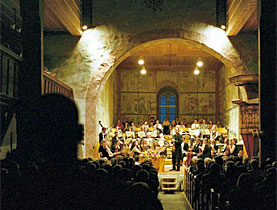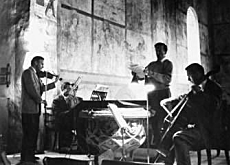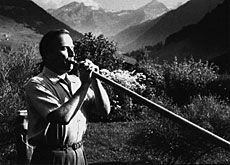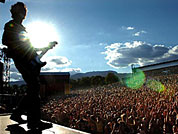Menuhin’s spirit lives on at Gstaad festival

It is ten years since the great violinist Yehudi Menuhin died, but his legacy can still be felt at the music festival he created in the small alpine village of Gstaad.
Christoph Müller, music director of the festival, which starts on Friday, tells swissinfo.ch about his vision for the event, the effects of the economic crisis and how musicians manage to play in a tent.
Menuhin, of Russian Jewish background, had a long career which took him all over the world. In 1957 he decided to settle with his family in Gstaad, in the Bernese Oberland. He founded the festival, originally just a few concerts among friends, the same year.
The star-studded event now lasts almost two months and attracts around 20,000 visitors each year. Musicians play in a huge festival tent in Gstaad, as well as in several churches in the nearby Saanan region.
The dynamic Müller, who at 38 is one of the youngest culture managers in the business, has been at the helm of the Menuhin Festival Gstaad since 2002. This year a special concert featuring some of Menuhin’s favourite pieces will be held to mark the anniversary of the maestro’s death.
swissinfo.ch: You have been credited with giving the festival a new image. What is your vision?
Christoph Müller: We want to maintain the legendary spirit of Lord Menuhin but also be a young, active and inspiring festival, which is not always so easy to do. So we founded several cycles of concerts along the lines of how Menuhin lived music.
One important step was to concentrate all the chamber music activities, which are located in the beautiful old churches in the Saanen region where Menuhin originally founded the festival. Menuhin used to surround himself with his musical “family” of friends and pupils. So we invite an artist in residence each year, who performs chamber concerts with friends. We’ve had Alfred Brendel, Sabine Meyer and Joshua Bell in the past and this year it’s the violinist and cellist brothers Renaud and Gautier Capuçon and pianist Hélène Grimaud. We have also created the new concert series, Today’s Music, following Menuhin’s idea of organising exchanges between other cultures and musical styles, such as jazz or folk.
This year we’re very proud to present the mezzo-soprano Cecilia Bartoli and her mother, her only teacher, giving a master class for the Gstaad Vocal Academy. Together they will teach ten-15 students in public lessons and there will be a final concert. Cecilia Bartoli is also giving a recital in a church in Saanan. This is exactly what Menuhin did during his time.
swissinfo.ch: What factors count when putting on a music festival in a small alpine village and partly in a tent?
C.M.: An important factor is the location. It’s simply a very attractive environment in Gstaad because there are so many ways to feel good – the nature, the good food and hotels. It was simply a fantastic idea of Menuhin’s 53 years ago to put a festival in the middle of this. In 2009 these factors still count.
The festival tent, which has 2,000 seats, was only added 20 years ago because the audience wanted more symphony concerts and not only chamber music. That’s why it was decided to enlarge the festival.
swissinfo.ch: Does the tent have special acoustics?
C.M.: Yes, it’s a festival concert tent and not just an ordinary tent. The stage is made of wood and has been built with music in mind. The stage environment helps to develop a very suitable sound. It’s always amazing that our famous artists and orchestras, such as the London Symphony Orchestra, are completely surprised about the sound quality, as a lot of them are a little bit sceptical beforehand. I’m very happy that we decided on this quality. It’s a good thing for the future of the festival.
swissinfo.ch: The theme of the festival is perfection. Will we see it this year?
C.M.: We have several artists who stand for perfection in their art, such as Edita Gruberova, who [aged 62] is still one of the leading coloratura sopranos. She is one of the regular guests at the State Operas in Munich and Vienna for Donizetti operas and she’s coming for the first time this year. Also the pianist Arcadi Volodos, who plays with the City of Birmingham Symphony Orchestra, is famous for his perfection in certain repertoires, such as Liszt, and has produced standard recordings.
But we also want to show a series of late works of famous composers which are considered to be their most perfect works, for example the last string quartets of Beethoven or the famous Mass in B Minor by Johann Sebastian Bach, which has been called one of the most perfect compositions ever written.
We can take this theme as a challenge to ourselves, to ask what perfection is and whether we are perfect… Nowadays the environment for classical music is not so easy with the financial crisis, so it’s a good moment to discuss perfection.
swissinfo.ch: Have you felt the effects of the financial crisis?
C.M.: On the sponsor side, we are very happy as we have very loyal sponsors. We have a few problems with individuals who have been very important to the festival and who are a little bit restricted this year. We don’t feel the effects on the audience – on the contrary, we are in an even better position than last year when we had record visitor figures.
swissinfo.ch: You are very much in demand as a concert organiser. How does your music and economic background help you in your job?
C.M.: It’s a good start to do this kind of work but in the end, you need passion and to be a little bit crazy about all this work. You have to believe in ideas and projects and you need to fight for these ideas because it’s not always very easy to realise them and you need a lot of energy to do it. It’s not a normal job, like working in a bank. It really takes up your time – sometimes at night you dream about it! But I love it and I’m still full of energy and the desire to develop all my future projects.
Isobel Leybold-Johnson, swissinfo.ch
The Menuhin Festival Gstaad runs from July 17 to September 5.
It is the second-oldest festival in Switzerland after the Lucerne Festival.
Menuhin, born in 1916 in New York, is considered one of the 20th-century’s greatest violinists. He was also a conductor and a humanist.
He moved to Gstaad in 1957 and was impressed by the natural environment and the meeting of cultures. The festival began in a church in Saanan with two concerts among friends and quickly grew.
Menuhin was interested in other music forms and cultures, for example Indian sitar player Ravi Shankar came twice in the 1970s. Menuhin himself was interested in yoga and meditation. He also set up the Menuhin Music Academy in Gstaad to promote young talent.
He died in Berlin while on tour in March 1999, aged 82.
Müller, originally from Basel, is a trained musician who has also studied economics. He has many strings to his bow, but his main job is manager of the Basel Chamber Orchestra.
He also organises the Solsberg festival near Basel with his partner the cellist Sol Gabetta, as well as the Interlaken Classics and a series of concerts in Lucerne. He also finds time to keep playing the cello professionally.
He says that all of his activities are complementary, running at different times of the year and providing him with a fruitful artistic input.

In compliance with the JTI standards
More: SWI swissinfo.ch certified by the Journalism Trust Initiative




You can find an overview of ongoing debates with our journalists here. Please join us!
If you want to start a conversation about a topic raised in this article or want to report factual errors, email us at english@swissinfo.ch.